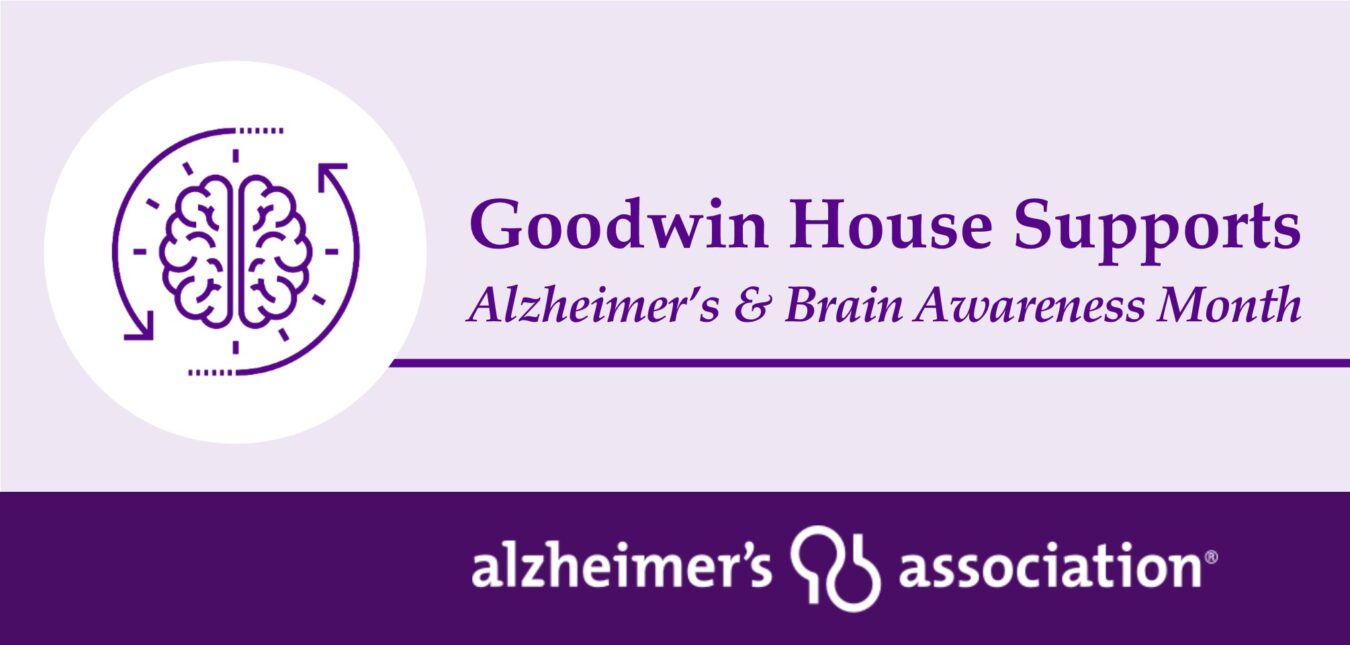June 10, 2021
Alzheimer’s & Brain Awareness Month | Four Tips for Better Brain Health
by Jessica Fredericksen, CDP, MSW, RCAL
June is Alzheimer’s and Brain Awareness month. To support the efforts to raise awareness, we plan to post weekly blog articles by Goodwin Living Brain Health Program Manager Jessica Fredericksen. This week, Jessica offers four tips for better brain health.
Four Tips for Better Brain Health
We know taking care of our bodies is important, but what about our minds? It is so important to take care of our brain health at any age. There are many ways we can take better care of our brain health. Here are four tried and true ways we can take action:
1. Mediterranean Diet
Research has shown that the Mediterranean diet is one of the healthiest diets. Packed full of nutrients, this way of eating is effective in reducing the risk of cardiovascular disease and overall mortality. New research indicates that the Mediterranean diet may also prevent memory loss and dementia.
The evidence posed in the latest study, published by the American Academy of Neurology, suggests that the Mediterranean diet is great for your brain because it supplies the brain with Omega-3 fatty acids, reduces inflammation and may reduce buildup of tau and amyloid proteins in the brain, which are linked to dementia.
The Mediterranean diet consists of low-fat foods and fruits, vegetables, whole grains and beans. In terms of animal-based proteins, the Mediterranean diet relies heavily on fish that have high levels of Omega-3, which “helps preserve brain function and facilitate communication through the cells” (Healthline).
2. Exercise Your Brain
Brain exercises can reduce or prevent memory impairment. We know the importance of exercising our bodies regularly, but we don’t always apply that same importance to exercising our brains. There are a lot of brain exercises out there, but exercises that stimulate the brain’s prefrontal cortex, which controls memory retrieval, show great results for those concerned with memory loss.
One program designed specifically to stimulate the prefrontal cortex is StrongerMemory by Goodwin Living. Participants in StrongerMemory spend 20 to 30 minutes a day reading out loud, quickly completing simple math problems and writing by hand. These three basic exercises activate the prefrontal cortex and both hemispheres of the brain, which in turn can improve memory and reduce symptoms of mild cognitive impairment (MCI).
Exercises like the ones in StrongerMemory can also be done as a preventative effort. Spending 20-30 minutes a day on these exercises keeps your prefrontal cortex activated. The key to success with brain exercise is consistency—try to do a little bit of brain exercise every single day to maintain a healthy brain.
3. Walking, Even Just Three Times a Week
A common idea regarding brain health is this: “What is good for your heart is good for your head.” That is certainly true when it comes to exercise. Exercise improves our heart’s ability to function, which then allows more blood to pump to our brains. Increased blood flow to our brains improves our cognitive abilities.
A recent study analyzed participants who did light aerobic activities several times a week. They found that the individuals who exercised several days each week had increased blood flow to their brains. Even taking a brisk walk three times a week can be a huge step toward better brain health.
4. Socialization
During the COVID-19 pandemic, people experienced a level of isolation that for most was quite different than anything they had previously endured. While we were aware of the effects socialization has on brain health before this past year, it is getting renewed attention as society slowly starts to reopen.
Social interaction can improve brain health and help prevent cognitive decline. According to the Cleveland Clinic, “a rich social network provides sources of support, reduces stress, combats depression, and enhances intellectual stimulation”.
Some ways to increase your socialization can be to get involved with a hobby group. Maybe you’ve always loved playing cards—you can look into joining a group that regularly meets to play rummy or bridge. Joining a book club or getting involved in local community events are other great ways to make friends and increase your social interaction. Pets can also provide great benefits to mental health and social interaction.
In conclusion, if you’re looking to better your brain health there are many options out there. Scientists continue to research new ways we can improve our cognition. These four tips to better your brain have been studied in a variety of different ways and been proven effective. Start by just adding one of these strategies to your lifestyle and see if you notice a difference in your brain health!
______________________________
Jessica Fredericksen, CDP, MSW, RCAL, joined Goodwin Living in early 2021 as Brain Health Program Manager. She is focused on advancing brain health and dementia awareness through education, the StrongerMemory program and serving on the Dementia Advance Team. She collaborates with staff across all Goodwin Living Incorporated service lines to provide creative brain health programming. Jessica is a Certified Dementia Practitioner (CDP) with a Masters in Gerontological Social Work (MSW) from Washington University in St. Louis. Before joining Goodwin Living, she worked for an Assisted Living & Memory Care company in the Midwest where she gained experience as an Executive Director and Corporate Director of Community Excellence. She spent most of her time traveling to train and support communities and care partners to provide excellent, person-directed care. When she’s not focused on brain health, Jessica enjoys volunteering with her church’s Youth Group and taking hikes with her cockapoo, Chloe Rose.





